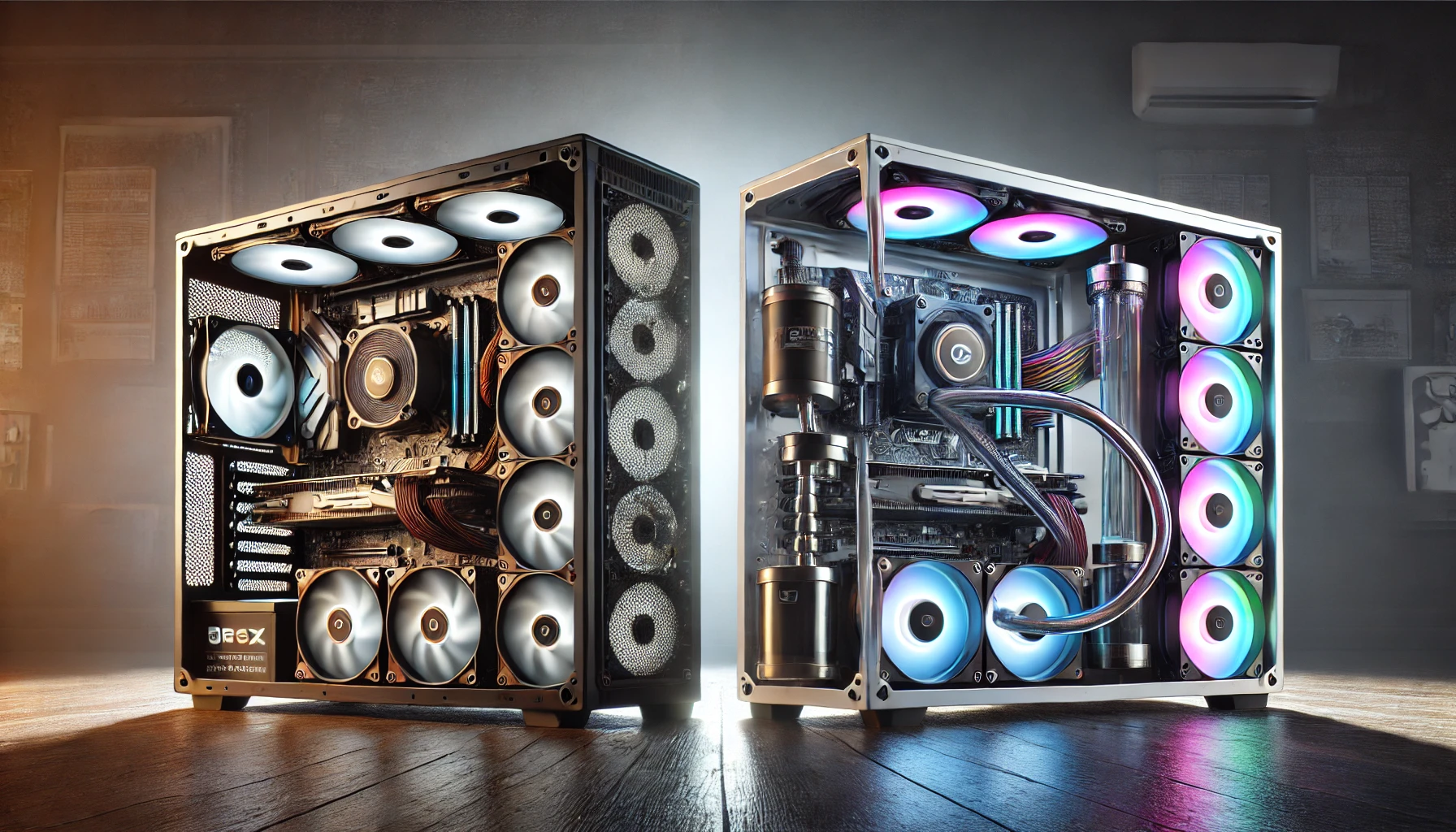When it comes to keeping your CPU and PC components cool, you have two main options: air cooling and water (liquid) cooling. Both serve the same purpose — managing heat — but they do it in very different ways, each with its own advantages, disadvantages, and ideal use cases.
In this guide, we’ll explore the key differences between air cooling and water cooling, helping you decide which solution is best for your setup.
1. How Each Cooling Method Works
🌀 Air Cooling (Air Cooler)
Air coolers use a heatsink (usually aluminum or copper) that draws heat away from the CPU. A fan then blows air over the heatsink to dissipate the heat.
- Passive heat transfer through metal fins
- Active airflow with attached fan(s)
💧 Water Cooling (Liquid Cooling or AIO)
Water coolers circulate liquid through a closed loop to transfer heat from the CPU to a radiator. The radiator is then cooled by one or more fans.
- Coolant absorbs heat from the CPU
- Pump moves the liquid through tubes to the radiator
- Fans cool the radiator
💡 Both cooling methods rely on airflow — water cooling just moves the heat farther away before it’s dispersed.
2. Cooling Performance
| Feature | Air Cooling | Water Cooling |
|---|---|---|
| Cooling Power | Good for most CPUs | Excellent for high-performance CPUs |
| Heat Dissipation | Near CPU socket | Away from CPU (radiator) |
| Efficiency under load | Moderate | Superior (especially under stress) |
💡 Water cooling is more effective at maintaining low temps during heavy workloads or overclocking.
3. Installation and Compatibility
🧰 Air Cooling:
- Easier to install
- Fewer parts
- Heavier and bulkier near the CPU
- May block tall RAM modules or be too large for small cases
💧 Water Cooling:
- Slightly more complex to install (especially tubing and radiator placement)
- Requires radiator mounting points in the case
- Cleaner aesthetic with low-profile CPU block
💡 Air coolers are plug-and-play; AIOs need planning for case layout.
4. Noise Levels
| Noise Factor | Air Cooler | Water Cooler (AIO) |
|---|---|---|
| Fan Noise | Varies by fan quality | Quieter under load |
| Pump Noise | N/A | Some models may produce hum |
| Overall | Can be louder | Usually quieter (premium models) |
💡 High-end air coolers and AIOs can both be very quiet if configured correctly.
5. Maintenance Requirements
🧼 Air Coolers:
- Low maintenance
- Clean dust from heatsink and fan every few months
🧼 Water Coolers (AIO):
- Also low maintenance (sealed loop)
- Long lifespan (~5–7 years)
- Watch for pump failure or noise over time
💡 Custom water cooling loops require significant maintenance (not covered here).
6. Cost Comparison
| Component | Air Cooling | AIO Liquid Cooling |
|---|---|---|
| Entry-Level | $20 – $40 | $60 – $90 |
| Mid-Range | $40 – $70 | $90 – $130 |
| High-End | $80 – $110 | $130 – $200+ |
💡 Air coolers are more budget-friendly, but premium AIOs offer better aesthetics and cooling.
7. Visual Aesthetics
- Air Coolers: Bulky but some models have RGB lighting
- AIOs: Sleek and clean, often with RGB pump heads, better for tempered glass builds
- Winner for Looks: Water cooling (especially with custom loops)
💡 If your PC case has a window, water cooling often looks more modern and minimal.
8. Size and Clearance
| Consideration | Air Cooling | Water Cooling |
|---|---|---|
| Height clearance (CPU tower) | Needs 150–165mm+ | Low profile at CPU |
| RAM clearance | Can interfere with tall RAM | No obstruction |
| Case support | Fits most mid/full towers | Needs radiator mounts |
💡 Always check your case specs before buying either cooler.
9. Overclocking Capabilities
If you plan to overclock your CPU, cooling becomes more important.
- Air Cooling: Sufficient for mild to moderate overclocks
- Water Cooling: Handles higher voltages and temps better
💡 For serious overclockers, AIOs or custom loops are the preferred choice.
10. Longevity and Reliability
- Air Coolers: Fewer moving parts, highly durable
- AIOs: Sealed units, but pumps can fail over time
- Warranty: Both often come with 3–6 year warranties
💡 Air coolers are more “set it and forget it”; AIOs need occasional monitoring.
Final Thoughts: Which One Should You Choose?
Choose Air Cooling if:
✅ You’re building on a budget
✅ You want simple installation and low maintenance
✅ Your CPU isn’t heavily overclocked
✅ Your case has good airflow
Choose Water Cooling (AIO) if:
✅ You want better thermal performance
✅ Your build is high-end or overclocked
✅ You care about aesthetics and RGB
✅ Your case supports radiator mounts
✅ Summary Table:
| Feature | Air Cooling | Water Cooling (AIO) |
|---|---|---|
| Installation | Easier | Slightly more complex |
| Cooling Performance | Good | Excellent |
| Noise | Moderate | Lower (in premium models) |
| Cost | Cheaper | More expensive |
| Maintenance | Minimal | Minimal (but pump monitoring) |
| Looks | Functional | Sleek and modern |
No matter which you choose, a properly installed and maintained cooling system will keep your PC running smoothly for years to come.
